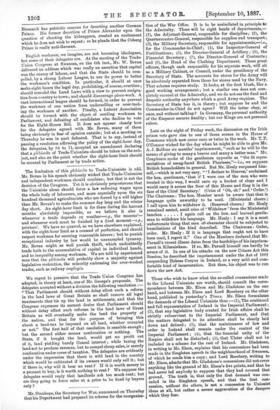English workmen, we imagine, are not becoming ideologues, but some
of their delegates are. At the meeting of the Trade- Union Congress at Swansea, on the 6th Met, Mr. W. Bevan delivered an address which was really an assertion that capital was the enemy of labour, and that the State should be com- pelled, by a strong Labour League, to use its power to better the workmen's condition. In particular, it should at once make eight hours the legal day, prohibiting, of course, overtime; should remodel the Land Laws with a view to prevent emigra- tion from country to town; and should discourage piece-work. A vast international league should be formed, in order to prevent the workmen of one nation from underselling or over-task- ing the workmen of another. Finally, a Labour Association should be formed with the object of sending workmen to Parliament, and defeating all candidates who decline to vote for the Eight-Hours Bill. It does not appear clearly how far the delegates agreed with Mr. Bevan, many of them being obviously in fear of opinion outside; but at a meeting on Thursday he was in part defeated. That is to say, instead of passing a resolution affirming the policy of the eight-hour day, the delegates, by 84 to 11, accepted an amendment declaring that a plebiscite of Trade-Unionists should be taken on the sub- ject, and also on the point whether the eight-hour limit should be secured by Parliament or by trade action.


































 Previous page
Previous page